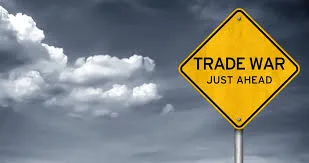Introduction

Trade wars, characterized by the imposition of tariffs, quotas, or other trade barriers between countries, have been a recurring phenomenon throughout history. These economic conflicts can have far-reaching consequences, impacting not only the countries directly involved but also the global economy as a whole. This article will delve into the causes, consequences, and potential solutions to trade wars.
Causes of Trade Wars
Trade wars can arise from a variety of factors, including:
- Protectionism: Countries may impose tariffs or quotas to protect domestic industries from foreign competition. This can be motivated by a desire to preserve jobs, protect national security, or promote economic self-sufficiency.
- Retaliation: Trade wars can escalate when one country retaliates against another country’s trade barriers. This can lead to a cycle of tit-for-tat actions, resulting in a significant escalation of tensions.
- Economic Nationalism: Some countries may adopt policies that prioritize domestic interests over international cooperation. This can lead to a more protectionist stance and increased tensions with trading partners.
- Geopolitical Factors: Trade wars can be used as a tool of geopolitical strategy, to exert pressure on other countries or to achieve specific foreign policy objectives.
Consequences of Trade Wars
Trade wars can have a significant negative impact on the global economy, including:
- Reduced Economic Growth: Tariffs and other trade barriers can increase the cost of goods and services, leading to higher prices for consumers and reduced consumer spending. This can, in turn, slow economic growth and job creation.
- Disruption of Supply Chains: Trade wars can disrupt global supply chains, leading to shortages of essential goods and components. This can have a negative impact on businesses and consumers alike.
- Retaliation and Escalation: Trade wars can escalate as countries retaliate against each other’s trade barriers, leading to a cycle of economic damage.
- Increased Uncertainty: Trade wars can create uncertainty and instability in the global economy, discouraging investment and economic activity.
- Damage to International Cooperation: Trade wars can erode trust and cooperation among nations, making it more difficult to address other global challenges.
Potential Solutions
Addressing trade wars requires a concerted effort from all parties involved. Some potential solutions include:
- Negotiation and Diplomacy: Countries should engage in negotiations and diplomacy to resolve trade disputes peacefully.
- Multilateral Cooperation: International organizations, such as the World Trade Organization (WTO), can play a crucial role in promoting free trade and resolving trade disputes.
- Reducing Protectionism: Countries should gradually reduce trade barriers and move towards a more open and competitive global economy.
- Addressing Underlying Issues: Addressing the underlying causes of trade wars, such as economic inequality and geopolitical tensions, is essential for long-term stability.
Conclusion
Trade wars are a complex economic phenomenon with far-reaching consequences. While they can be motivated by a variety of factors, the negative impacts on the global economy are undeniable. To mitigate the damage caused by trade wars, it is essential for countries to engage in diplomacy, promote multilateral cooperation, and work towards a more open and equitable global trading system.
Upload an image
This prompt requires an image that you need to add. Tap the image button to upload an image. Got it
Need a little help with this prompt?
Power up your prompt and Gemini will expand it to get you better results Got it



